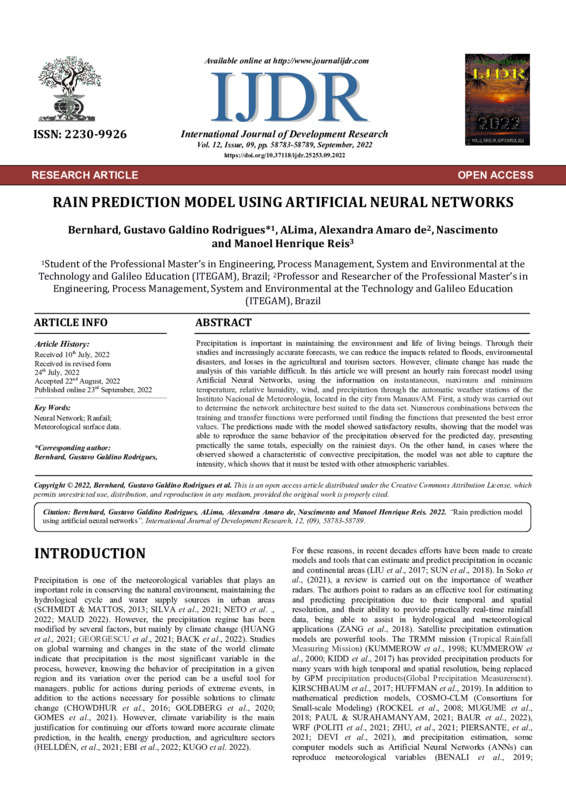-
Tipo do ITEM
-
Artigo Ciêntifico
-
Título do Artigo
-
RAIN PREDICTION MODEL USING ARTIFICIAL NEURAL NETWORKS
-
Descrição
-
Precipitation is important in maintaining the environment and life of living beings. Through their studies and increasingly accurate forecasts, we can reduce the impacts related to floods, environmental disasters, and losses in the agricultural and tourism sectors. However, climate change has made the analysis of this variable difficult. In this article we will present an hourly rain forecast model using Artificial Neural Networks, using the information on instantaneous, maximum and minimum temperature, relative humidity, wind, and precipitation through the automatic weather stations of the Instituto Nacional de Meteorologia, located in the city from Manaus/AM. First, a study was carried out to determine the network architecture best suited to the data set. Numerous combinations between the training and transfer functions were performed until finding the functions that presented the best error values. The predictions made with the model showed satisfactory results, showing that the model was able to reproduce the same behavior of the precipitation observed for the predicted day, presenting practically the same totals, especially on the rainiest days. On the other hand, in cases where the observed showed a characteristic of convective precipitation, the model was not able to capture the
intensity, which shows that it must be tested with other atmospheric variables.
-
Abstract
-
Precipitation is important in maintaining the environment and life of living beings. Through their studies and increasingly accurate forecasts, we can reduce the impacts related to floods, environmental disasters, and losses in the agricultural and tourism sectors. However, climate change has made the analysis of this variable difficult. In this article we will present an hourly rain forecast model using Artificial Neural Networks, using the information on instantaneous, maximum and minimum temperature, relative humidity, wind, and precipitation through the automatic weather stations of the Instituto Nacional de Meteorologia, located in the city from Manaus/AM. First, a study was carried out to determine the network architecture best suited to the data set. Numerous combinations between the training and transfer functions were performed until finding the functions that presented the best error values. The predictions made with the model showed satisfactory results, showing that the model was able to reproduce the same behavior of the precipitation observed for the predicted day, presenting practically the same totals, especially on the rainiest days. On the other hand, in cases where the observed showed a characteristic of convective precipitation, the model was not able to capture the
intensity, which shows that it must be tested with other atmospheric variables.
-
Língua do arquivo
-
inglês
-
Data da Publicação
-
Ano 2020
-
Palavra-chave
-
Neural Network
-
Ranfail
-
Meteorological surface data
-
Autores
-
Bernhard, Gustavo Galdino Rodrigues
-
Lima, Alexandra Amaro de
-
Nascimento and Manoel Henrique Reis
-
Local
-
ITEGAM - MANAUS, 2022
-
Áreas de Conhecimento
-
Energia e Meio Ambiente
-
Turma
-
Turma 01


